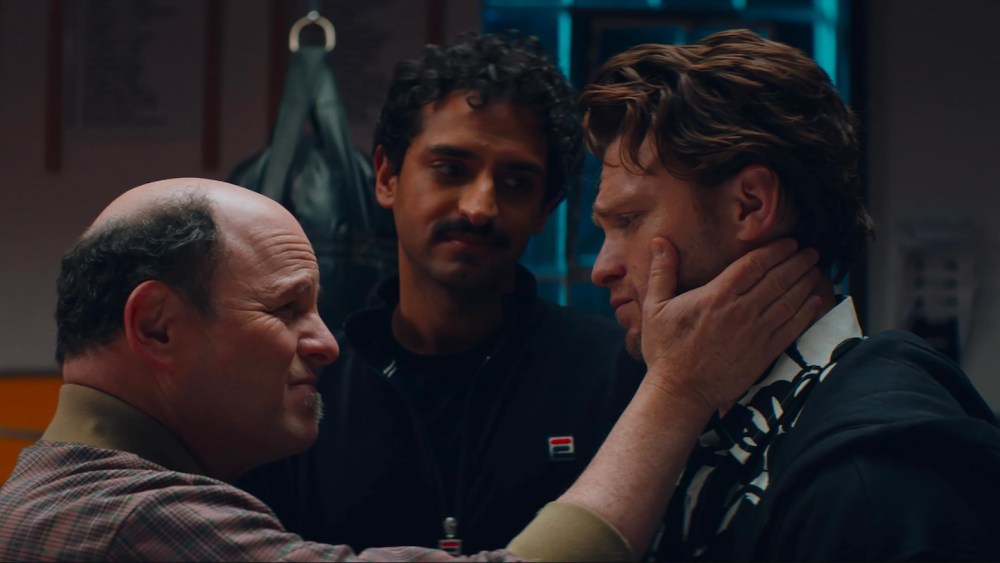While upbeat at a distance, self-reflexive heist caper “Stealing Pulp Fiction” seldom translates its good nature through story or style. Danny Turkiewicz’s feature debut follows a pair of best friends in over their heads as they try to steal Quentin Tarantino’s personal 35mm film print of his 1994 indie landmark “Pulp Fiction.” However, malformed comedy and character beats keep the movie feeling like a rough first draft.
With a score that harkens back to the “Pulp Fiction” soundtrack — and to Keith Mansfield’s “Funky Fanfare,” the groovy tune played over tie-dye “Our Feature Presentation” pre-movie title cards in the ’60s and revived for repertory screenings — the film has no dearth of musical in-jokes. However, that’s the extent of its meta-textual prowess, in spite of its ceaseless references to Tarantino.
Paying homage to Hollywood’s own remix maestro is an easy trick for a young director, but “Stealing Pulp Fiction” makes even mimicry seem laborious. It begins with best pals Jonathan (Jon Rudnitsky) and Steve (Karan Soni) concocting ambitious (if dimwitted) business ideas in a restaurant booth, a clear homage to “Pulp Fiction”’s diner prologue, before the duo attends a special screening of their favorite film at a Tarantino-owned cinema. One of Steve’s harebrained schemes involves founding a movie theater speakeasy, for which the film-loving pair decides to pinch the private print at the following week’s engagement. However, what appears to be a story literalizing obsessive cinephilia (Jonathan even dresses like Tim Roth’s Pumkin’) quickly sidelines any importance that Tarantino, “Pulp Fiction” or even movies at large might have in these characters’ lives.
The heist soon becomes about selling the movie for money, though it at least remains nominally tied to the original concept via the duo’s sardonic friend Elizabeth (Cazzie David), who they rope into the scheme specifically because she despises Taranino’s work, and wants to burn her share of the print. How this aids their plan longterm is anyone’s guess, though it’s one of just several sudden character and plot turns that feel improvised at a moment’s notice.
Jonathan and Steve happen to share a therapist, the ineffectual Dr. Mendelbaum (Jason Alexander), and in order to rope him in, the movie gets inexplicably sidetracked with a secondary heist at his office, as Jonathan hopes to find information on one of his attractive female patients, Rachel (Taylor Hill). Despite its sparse 78-minute runtime and its bluntly to-the-point title, “Stealing Pulp Fiction” is scattered and unwieldy. Most of its comedic punchlines are delivered clumsily, as the music abruptly cuts out in order to signal that a joke has been delivered.
Jonathan and Steven’s friendship is occasionally delightful to watch, if only because the actors share the comfortable chemistry of lifelong pals. That the pair feel as though they’ve walked into any given scene from two separate movies — Soni from a naturalistic mumblecore piece, Rudnitsky from a stylized action pastiche — is surprisingly no issue, given how well the performers gel. However, their characters’ platonic intimacy (with its gentle hints of queer subtext) is seldom challenged by the plot, which itself sees few complications as it unfolds.
“Pulp Fiction” has been a cinematic gateway drug for three decades, just as Tarantino’s own repertoire (one of elevating B-movies through audio-visual remixing) has become a language unto itself. However, it can be hard to tell if “Stealing Pulp Fiction” has command over any kind of cinematic vocabulary, let alone one specific to its filmmaking subject. Every scene and gag plays out in noncommittal fashion, with an unmoving, unobtrusive camera capturing stilted compositions.
However, when things finally get going — which is to say, when the heist kicks off in Tarantino’s cinema, and Jonathan and Steve try to invade the projection booth — it becomes obvious that this movie’s key cinematic reference point ought not to have been “Pulp Fiction” at all. Rather, it should’ve been Tarantino’s edgier, bloodier and movie-theater-set “Inglourious Basterds” (to which “Stealing Pulp Fiction” does eventually make passing reference, but in a manner unrelated to the heist).
It loses steam quicker than it can build it. This is largely owed to its specific reliance on getting lost among all those references, but an equally major culprit is its constantly shifting theme and focus. Its humor is tasked with hitting targets that are constantly in motion, so the characters never fully materialize, preventing us from partaking in their inside jokes or even the humor of their mannerisms. Whether “Stealing Pulp Fiction” is about a film’s importance to them or about the space they occupy in each other’s lives, no ideas stick around long to pay off any single setup. This would hurt even the most polished comedy or the most clockwork heist movie, let alone one that hopes to be both.
Read the full article here


